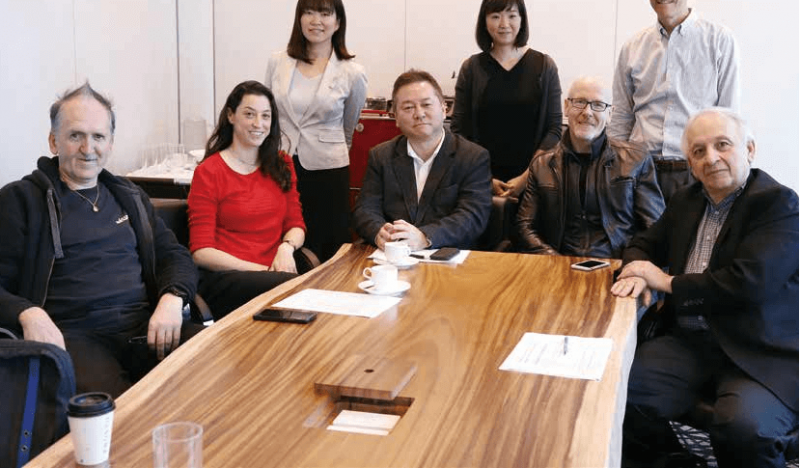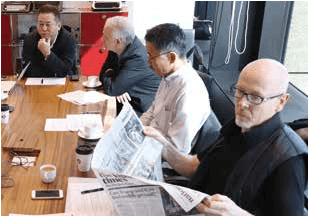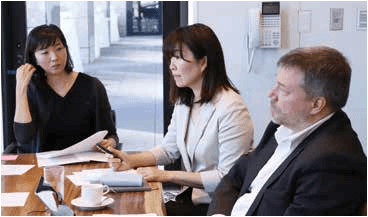Issue:

Left to right, Fred Varcoe (freelance), Abby Leonard (freelance), Yuka Ito (PAC), co-chair Teddy Jimbo (Video News), Akiko Saikawa (PAC), co-chair David McNeill (The Economist), Ken Moritsugu (AP), Roger Schreffler (WardsAuto).
Inviting those in the headlines to face the questions of journalist Members is one of the core elements of the FCCJ. Meet the Professional Activities Committee the team that’s responsible for the lineup.
Aforeign correspondents’ club that lacks a hard driving and fast acting committee dedicated to bringing in speakers to address the most pressing and newsworthy issues of the day, David McNeill reckons, is about as much use as the proverbial chocolate teapot.
Joint chair of the FCCJ’s Professional Activities Committee (PAC) and a correspondent for the Economist, McNeill has served on the board and the Club’s Freedom of the Press Committee as well as editing the Number 1 Shimbun, but considers PAC to be the heart of what the Club is about. “What are we if we’re not a fully functioning club that facilitates the work of journalists?” McNeill said.
The 12 member strong committee is charged with consistently delivering the people and issues that the Club’s members turn into column inches or video footage, he says, although he admits that is rarely as straightforward as it might be. “PAC is made up of working journalists who vote on events. If it is working well, it brings in speakers that are of use to the Club’s members,” he said. “If it doesn’t do that, then members of the FCCJ cannot be plugged in to what is going on in Japan and the region.”
Members of the committee meet once a month to propose speakers for the weeks ahead, although they communicate recommendations via e-mail when a breaking news story requires swift action to arrange for a speaker to address the Club.
In February, for example, the committee’s discussions led to invitations being extended to Denny Tamaki, the governor of Okinawa, to speak after the prefecture wide referendum on U.S. bases, and to the “combative” new lawyer who has been taken on to defend Carlos Ghosn in his legal struggles with Nissan Motor Co.
A SENIOR POLITICIAN DEMANDED ALL THE QUESTIONS THAT HE WOULD FACE AFTER HIS SPEECH IN ADVANCE. AND WAS NOT EMBARRASSED AT MAKING THE DEMAND.
At a PAC meeting, committee members consider the newsmakers. On the right, a member who missed our portrait, Martin Koelling.
PHOTOS: YOSHIKAZU TSUNO
The press conference in January with Ghosn’s previous lawyer with McNeill as moderator was one of the best attended in the FCCJ’s history. With the world’s media watching and the FCCJ logo prominent in the background, that sort of publicity can only be a good thing. The committee continues to try to get Greg Kelly who is accused of abetting Ghosn’s alleged illegal actions to speak at the Club, along with officials from the prosecutor’s office for the other side of the story.
THERE IS A STANDING request in with the government for someone from the cabinet to speak at the Club, although McNeill admits it has been a “real struggle” to convince the administration of Prime Minister Shinzo Abe to engage with the foreign media since he returned to power in 2012. “We have never had Abe since he was elected in 2012; in fact, we have not had [Finance Minister] Taro Aso or any foreign minister since then,” McNeill said. “We have put in a lot of effort to get them to come, but to no avail. It now feels like a boycott.”
It is possible that the government considers the FCCJ to be in decline, with an ageing and shrinking core of fulltime correspondents, more freelancers and bloggers writing for an online audience, but they almost certainly prefer scripted events that they are able to control unlike the press conference on Sept. 25, 2014 in which Eriko Yamatani, chair of the National Public Safety Commission, ended up “like a rabbit in the headlights,” McNeill said.
Arriving with the expectation of discussing North Korea’s kidnapping of Japanese nationals, she was instead quizzed on the recent revelation of her close links to Zaitokukai, described by McNeill himself in a report on the event as “perhaps Japan’s most toxic racist group.” The result was not the choreographed reception she could have expected at the National Press Club, but an example of how the media operates in most parts of the world with a strong press.
McNeill says he was “astonished” when another senior politician demanded all the questions that he would face after his speech in advance. And was not embarrassed at making the demand. Instead of free for all press conferences, the government has introduced “surgical strikes” in the form of invitation only meetings with bureau chiefs, often off the record. The downsides are obvious; most FCCJ members cannot access these senior government ministers and invitations can suddenly stop if the correspondent is perceived to have stepped out of line.
McNEILL SAYS HE HAS the utmost admiration for the FCCJ’s PAC staff, who are charged with reaching out to potential speakers and cajoling those who are reluctant to step out of their comfort zone. “We have superb staff who are brilliant at what has to be quite a demanding job,” he said. “Nominating these people is the easy part; they have to do all the tough stuff.”
Akiko Saikawa, who oversees PAC events as media and press conferences liaison manager, plays down the scale of the task she regularly faces. “The hardest part is that we get so many requests from members suggesting people to come and speak at the Club: we can only have so many events,” she said.
“It is surprisingly easy to get some speakers to come, but on other occasions we have to work really hard to try to persuade them to come. In some cases, it can take more than a year,” Saikawa said. “At that point, they often agree because we have worn them down; they know we will just keep calling them until they agree. I think some of them come just so we will stop calling them.”
Along with Carlos Ghosn’s lawyer, a particularly memorable press conference for McNeill was David Kaye, the United Nations Special Rapporteur on the promotion and protection of the right to freedom of opinion and expression, because it shone a new light on the on going issue of Japan’s closed press club system and questions over the independence of the domestic media.
But there are still some high profile targets for the committee to convince to come to the Club. “It would be great to have the Emperor or the Crown Prince although that will likely never happen,” said McNeill. “But Abe would be a very important event for us and there is absolutely no reason why he could not come. We’re also obviously very keen to get Ghosn here just as soon as we can that would be huge for us.”
Julian Ryall is Japan correspondent for the Daily Telegraph.



